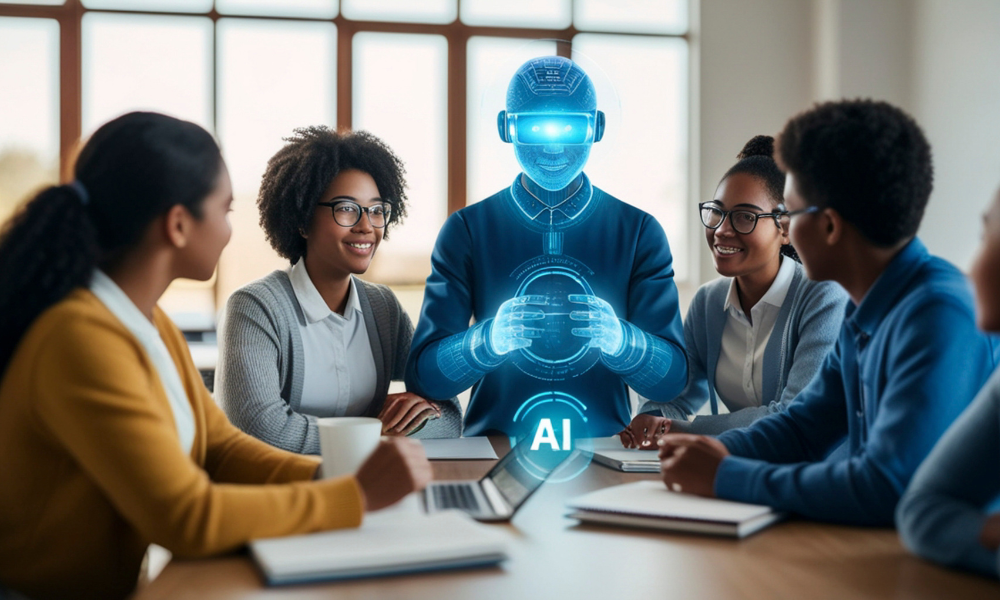
Artificial Intelligence (AI) has rapidly moved from being a futuristic concept to a powerful force driving business innovation, productivity, and economic growth. As industries undergo digital transformation, organizations are beginning to realize that the workforce of tomorrow must be equipped with AI-driven skills. But the question is: how do we prepare individuals and teams for this transformation? The answer lies in AI training, which is not just about technical upskilling but also about building adaptability, creativity, and strategic decision-making in an AI-powered world.
In this article, we will explore the significance of AI training, how it is reshaping industries, the opportunities it creates, and why it has become essential for professionals, businesses, and even educational institutions to embrace.
Why AI Training Matters for the Future of Work
The Fourth Industrial Revolution is marked by the integration of AI, machine learning, robotics, and automation into everyday business processes. Unlike earlier revolutions that focused mainly on mechanical or digital improvements, this one fundamentally changes how people work, learn, and make decisions.
Organizations are adopting AI for:
- Automating repetitive processes
- Enhancing data-driven decision-making
- Improving customer experiences
- Streamlining supply chains
- Predicting trends and risks
However, these benefits can only be realized if the workforce understands how to use, manage, and collaborate with AI systems. That’s where AI training steps in—helping people to build not only technical expertise but also the confidence to integrate AI into their daily responsibilities.
AI Training as a Driver of Workforce Transformation
1. Reskilling and Upskilling Employees
Many existing jobs are being redefined by AI. For example, marketing professionals are now expected to understand AI-powered analytics, while HR specialists use AI tools to screen resumes or predict employee turnover. Through AI training, employees can reskill to stay relevant in their current roles or upskill to explore new opportunities.
2. Creating AI-Ready Leaders
Tomorrow’s workforce is not just about technical execution—it also requires AI-savvy leaders who can align AI strategies with business goals. Training programs tailored for managers and executives ensure they can make smarter decisions by leveraging AI insights, without necessarily becoming programmers themselves.
3. Bridging the Talent Gap
There is a growing demand for AI professionals, but the supply of skilled talent is limited. By investing in AI training, companies can bridge this gap internally rather than relying solely on external hiring. This makes organizations more agile and competitive.
4. Encouraging Human-AI Collaboration
Instead of replacing humans, AI enhances their capabilities. Training helps employees understand how to collaborate with AI systems effectively, blending human creativity and emotional intelligence with machine efficiency.
Key Areas Covered in AI Training
AI training is not restricted to learning how to code or build algorithms. It encompasses a wide range of areas depending on industry needs and career paths:
- Fundamentals of AI and Machine Learning – Understanding how AI works and where it can be applied.
- Data Literacy – Learning how to analyze, interpret, and leverage data for decision-making.
- AI Tools and Platforms – Hands-on training with tools like ChatGPT, TensorFlow, or IBM Watson.
- Ethics and Responsible AI – Understanding issues around bias, privacy, and accountability in AI systems.
- Domain-Specific Applications – Tailored training for industries like healthcare, finance, education, and manufacturing.
This holistic approach ensures that both technical and non-technical professionals can benefit from AI training.
The Role of Educational Institutions
Universities and training organizations are playing a crucial role in preparing the next generation of professionals. Many have started integrating AI into their curriculum, offering certificate programs, degrees, and online learning opportunities. By doing so, they equip students not only with technical knowledge but also with the problem-solving mindset required in an AI-driven world.
For example:
- Business schools are teaching how AI impacts organizational strategy.
- Engineering colleges are offering specializations in machine learning.
- Online platforms are making AI training accessible to global learners.
This democratization of AI education ensures that the benefits of AI are not limited to tech specialists but are spread across industries.
Industry-Wise Impact of AI Training
Healthcare
AI-powered diagnostics, patient data management, and drug discovery are revolutionizing healthcare. Training medical professionals to use these tools ensures better patient outcomes.
Finance
From fraud detection to personalized banking, AI is reshaping financial services. Professionals trained in AI can identify risks, streamline compliance, and enhance customer trust.
Retail
Retailers use AI to predict consumer behavior, optimize inventory, and deliver personalized experiences. Training employees in these systems improves customer engagement.
Manufacturing
Automation and predictive maintenance powered by AI require factory workers and managers to understand AI-driven systems for efficient production.
Challenges in AI Training
While AI training is transformative, it comes with challenges:
- Resistance to Change – Employees may fear job loss or feel overwhelmed by new technologies.
- Skill Gaps – Non-technical professionals may find AI concepts difficult to grasp.
- Accessibility – Quality AI training programs may be expensive or limited in some regions.
Organizations must address these challenges by fostering a culture of continuous learning, offering affordable training opportunities, and highlighting the collaborative nature of AI.
Building a Future-Ready Workforce
AI training is no longer optional—it’s a necessity for individuals and businesses that want to thrive in the future of work. By embracing AI education, companies not only boost their productivity but also empower their employees to innovate and adapt. For professionals, it means staying competitive in a job market where AI literacy is fast becoming as important as computer literacy once was.
The workforce of tomorrow will be defined by how effectively humans and machines work together. With the right training, we can ensure that AI enhances human potential instead of replacing it, creating a smarter, more efficient, and more inclusive world of work.

